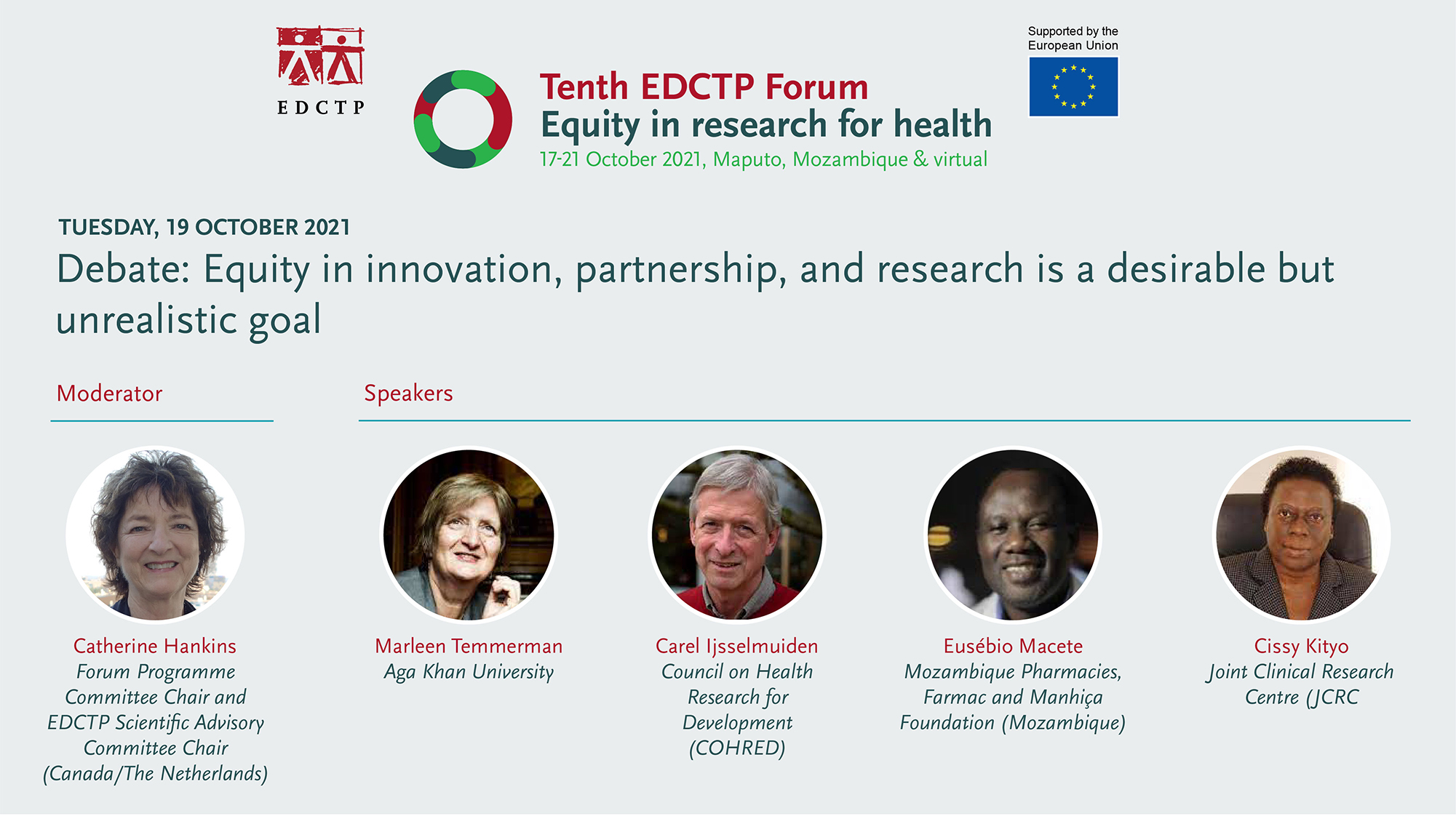By Paul Chinnock
Moderator for the debate was Catherine Hankins (Forum Programme Committee Chair and EDCTP Scientific Advisory Committee Chair). This, she said, was a session in which we hope to have some fun! She explained that there would be two teams in the debate and there would be an online vote on the motion both before and after the debate took place. In the first vote:
34% of participants agreed with the motion (i.e. that equity is desirable but not achievable)
55% voted against and
11% were undecided.
The audience was also asked to use the platform’s chat facility to make comments on the proceedings in real time.
In favour: Eusebio Macete (Mozambique Pharmacies, Farmac and Manhiça Foundation) said that of course equity was desirable! But he presented data (some of it EDCTP’s own) on the resources actually available for health research in Africa. Clearly Africa is unable to contribute the same level of funding as richer nations. It is unrealistic to think otherwise. Sadly, therefore equity is an unrealistic goal.
Against: Carel Ijsselmuiden, (Council on Health Research for Development, Switzerland) wondered whether there was anyone who thinks equity is not desirable. It is clear that many countries and philanthropists don’t want to share vaccine supplies and knowhow with Africa. A priority area for equity is vaccination rates. We must solve the issue of poor COVID-19 vaccination rates in Africa. We can do this, even though it may take a year or two. Just a few years ago no one would have thought middle-income countries would ever make their own vaccines but they are now doing so and exporting them. It can be done! We often over-emphasise financial equity; we should be thinking more about equity in the provision of effective care. This is necessary; it is crucial. Surely we can fix the problems caused by a ‘simple’ virus? If not, how will we solve the complex threat of climate change?
In favour: Marleen Temmerman, (Aga Khan University, Kenya) felt she had been given an easy task. Unfortunately, achieving equity is not possible. Prof. Ijsselmuiden has in fact contributed to the argument that it is unrealistic! We are not achieving equity on the issue of COVID-19; and we won’t be able to do so on more difficult challenges. The emergence of Ebola was also supposed to lead to a move towards equity. So was the publication of the Millenium Development Goals. It is a pity that no time limit has been defined in the motion. Prof. Temmerman was taking it to be our own lifetimes. We are just not going to do it.
Against: Cissy Kityo (Joint Clinical Research Centre, Uganda) was emphatic – equity can be achieved! Just look at countries like Korea that have moved upwards. Chinese solar power makers have a dominant position in the market (60-70% of products around us are made in China). These countries show us what can be done. Only 13% of research innovations have so far been in Africa but this can be increased. COVID-19 is a wake-up call. Yes, more funding must be devoted to research by Africa governments but there are encouraging examples of this being done. EDCTP funding should also lead to development of new products. The technology sector in Africa has already witnessed incredible growth. Sub-Saharan Africa is the region with the greatest number of economies performing ahead of expectations (based on their level of development). It won’t take beyond our lifetime – it is happening even now.
Points made from the floor included…
Action by African countries themselves and help from wealthier countries can make equity achievable.
The whole world has rallied on COVID-19 but it is not a good example, as we want not expect the same level of response on other issues. Others argued, however, that the pandemic can catalyse change.
China has a population of one billion but has shown the ability to contain COVID-19 and has invested greatly in health research. We too have the ability to move forward
Equity will come if everyone commits to it. It is only possible if everyone wants to make it happen
A change in attitude/mind-set is what is most needed.
Closing arguments
Eusebio Macete. A wonderful discussion. Humankind has always faced these difficulties. We can hope that one day the global population will be kind and share all its resources. But it is simply unrealistic.
Carel Ijsselmuiden. If you look at Ebola, Africa is not able to produce what it needs to control this disease but let us develop a pragmatic framework, with which we can achieve equity on many matters, and work on local capabilities and ecosystems.
Marleen Temmerman. I too wish we could put attitudes aside but it won’t happen. Though I still hope so!
Cissy Kityo. Africa is moving towards equity – we will get there with a mind-set change. Scoring in the post-debate vote:
27% of participants agreed with the motion (i.e. that equity is desirable but not achievable)
63% voted against and
11% were undecided.
The Moderator declared the motion to be defeated:
“We do believe equity is feasible, so let’s go!”

